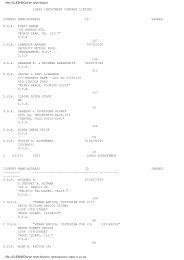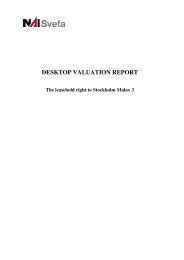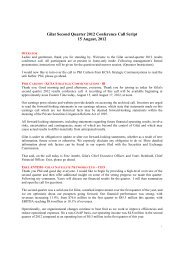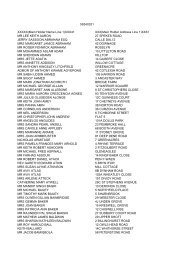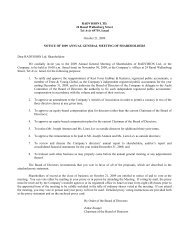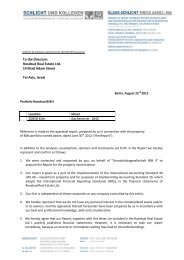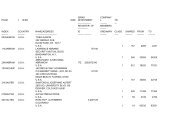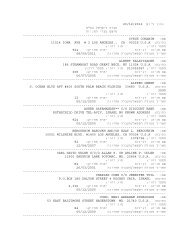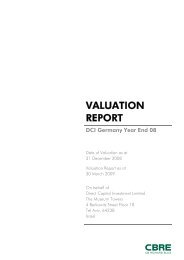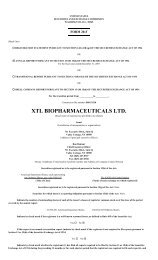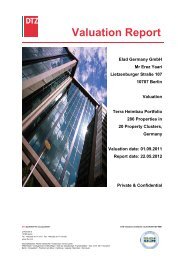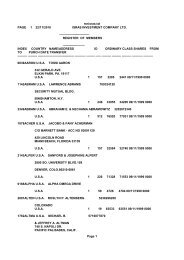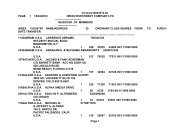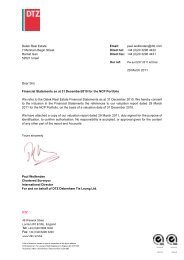RETALIX LTD.
RETALIX LTD.
RETALIX LTD.
You also want an ePaper? Increase the reach of your titles
YUMPU automatically turns print PDFs into web optimized ePapers that Google loves.
The benefits available to an approved enterprise are conditional upon compliance with the conditions stipulated in the law and related regulations<br />
and the criteria described in the specific certificate of approval. If a company violates these conditions, in whole or in part, it would be required to refund<br />
the amount of tax benefits and any grants received with interest and adjustments for inflation based on the Israeli consumer price index.<br />
A portion of our production facilities has been granted the status of Approved Enterprise. Income arising from our Approved Enterprise facilities is<br />
tax-free under the alternative package of benefits described above (for the first 2 years) and entitled to reduced tax rates (for the next five years). We have<br />
derived, and expect to continue to derive, a substantial portion of our income from our Approved Enterprise facilities. The tax benefits attributable to our<br />
current Approved Enterprises are scheduled to expire gradually through 2011.<br />
If a company distributes dividends from tax-exempt Approved Enterprise income, the company will be taxed on the otherwise exempt income at the<br />
same reduced corporate tax rate that applies to it after the initial exemption period. Distribution of dividends derived from Approved Enterprise income<br />
that was taxed at reduced rates, but not tax exempt, does not result in additional tax consequences to the company. Shareholders who receive dividends<br />
derived from Approved Enterprise income are generally taxed at a rate of 15%, which is withheld and paid by the company paying the dividend, if the<br />
dividend is distributed during the benefits period or within the following 12 years (but the 12-year limitation does not apply to a Foreign Investors<br />
Company). We are not obliged to distribute exempt retained profits under the alternative package of benefits, and may generally decide from which source<br />
of income to declare dividends. We currently intend to reinvest the amount of our tax-exempt income and not to distribute such income as a dividend.<br />
Amendment of the Investments Law<br />
On April 1, 2005, an amendment to the Investments Law came into effect, which revised the criteria for investments qualified to receive tax benefits.<br />
An eligible investment program under the amendment will qualify for benefits as a Privileged Enterprise (rather than the previous terminology of<br />
Approved Enterprise) if it is an industrial facility (as defined in the Investments Law) that will contribute to the economic independence of the Israeli<br />
economy and is a competitive facility that contributes to the Israeli gross domestic product. Among other things, the amendment provides tax benefits to<br />
both local and foreign investors and simplifies the approval process - the Privileged Enterprise routes do not require pre-approval by the Investment Center<br />
of the Israeli Ministry of Industry, Trade and Labor, “the Investment Center”. A company wishing to receive the tax benefits afforded to a Privileged<br />
Enterprise is required to select the tax year from which the period of benefits under the Investment Law are to commence by simply notifying the Israeli<br />
Tax Authority within 12 months of the end of that year. In order to be recognized as owning a Privileged Enterprise, a company is required to meet a<br />
number of conditions set forth in the amendment, including making a minimal investment in manufacturing assets for the Privileged Enterprise and having<br />
completed a cooling-off period of no less than three years from the company’s previous year of commencement of benefits under the Investments Law.<br />
The amendment does not apply to investment programs Approved prior to December 31, 2004.<br />
Pursuant to the amendment, a company with a Privileged Enterprise is entitled to certain tax benefits, provided that no more than 12 to 14 years have<br />
passed since the beginning of the year of election under the Investments Law. The tax benefits granted to a Privileged Enterprise are determined, as<br />
applicable to us, according to one of the following new tax routes:<br />
• Similar to the currently available alternative route, exemption from corporate tax on undistributed income for a period of two to ten years,<br />
depending on the geographic location of the Benefited Enterprise within Israel, and a reduced corporate tax rate of 10% to 25% for the remainder<br />
of the benefits period, depending on the level of foreign investment in each year. Benefits may be granted for a term of from seven to ten years,<br />
depending on the level of foreign investment in the company. If the company pays a dividend out of income derived from the Benefited Enterprise<br />
during the tax exemption period, such income will be subject to corporate tax at the applicable rate (10%-25%). The company is required to<br />
withhold tax at the source at a rate of 15% from any dividends distributed from income derived from the Benefited Enterprise; and<br />
• A special tax route enabling companies owning facilities in certain geographical locations in Israel to pay corporate tax at the rate of 11.5% on<br />
income of the Benefited Enterprise. The benefits period is ten years. Upon payment of dividends, the company is required to withhold tax at source<br />
at a rate of 15% for Israeli residents and at a rate of 4% for foreign residents.<br />
Generally, a company that is Abundant in Foreign Investment (as defined in the Investments Law) is entitled to an extension of the benefits period<br />
by an additional five years, depending on the rate of its income that is derived in foreign currency.<br />
The amendment changes the definition of “foreign investment” in the Investments Law so that the definition now also includes the purchase of<br />
shares of a company from another shareholder, provided that the company’s outstanding and paid-up share capital exceeds NIS 5 million. Such changes to<br />
the aforementioned definition will take effect retroactively from 2003.<br />
The amendment will apply to approved enterprise programs in which the year of election under the Investments Law is 2004 or later, unless such<br />
programs received approval from the Investment Center on or prior to December 31, 2004, in which case the amendment provides that the terms and<br />
benefits included in any certificate of approval already granted will remain subject to the provisions of the law as they were on the date of such approval.<br />
As a result of the amendment, tax-exempt income that will be generated under the provisions of the new Law will subject us to taxes upon<br />
distribution or liquidation and we may be required to record deferred tax liability with respect to such tax-exempt income. We are currently evaluating the<br />
impact the amendment will have on us. This may materially increase our provision for income taxes in 2006 and subsequent years.<br />
83



